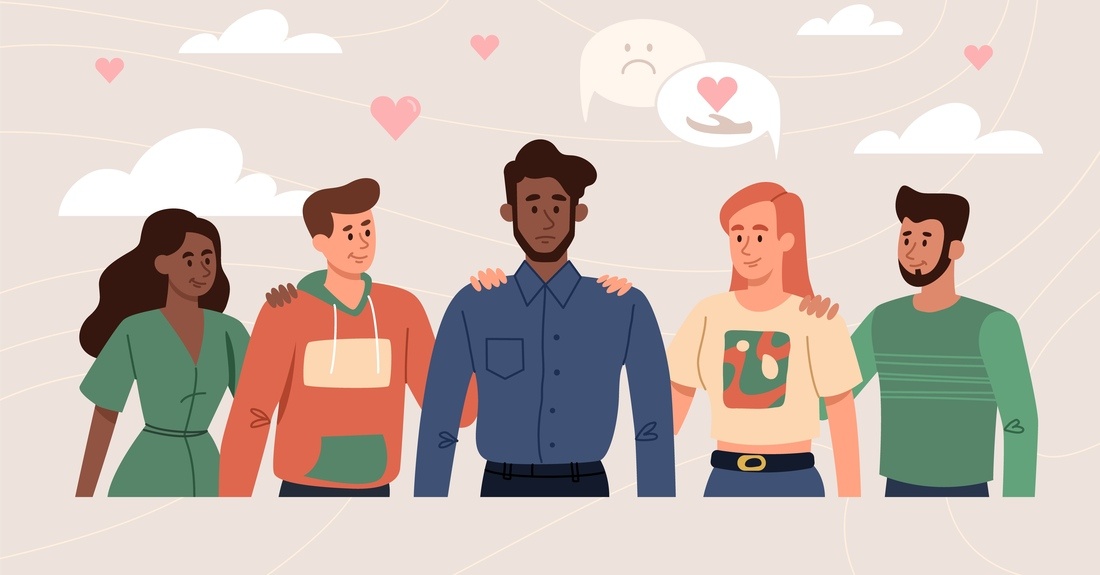Individuals struggling with their mental health can feel alone and misunderstood when, in fact, many people struggle with mental health. Consider that more than 1 in 5 American adults experience a short- or long-term mental health issue at some point in their lives.
What can make someone struggling with mental health feel less alone? A community that prioritizes mental health support. Let’s dive into some ideas for community resources for mental health support.

What is the role of the community in mental health?
We can define communities in many ways. Your community can be as large as a geographical region made up of multiple cities or as small as a neighborhood. You might consider a small group of friends or peers united around a cause or activity as a community. No matter how you define the community or communities you’re in, you’ve likely invested in this group of individuals with your time, money and other commitments because of the efforts the group has made to show they value you.
A community is only as strong as the individuals in it and the efforts they put into improving the collective group. When an issue is as widespread as mental health struggles, affecting more than 1 in 5 adults, it’s important to acknowledge those issues and how the environment around people experiencing negative mental health symptoms may be influencing them.
What is the impact of mental health on community?
Poor mental health affects people’s relationships with children, spouses, relatives, friends, neighbors and co-workers. It also can impact their ability to perform work and other activities.
Think of community and mental health as simply as this: When someone is struggling with mental health, those close to them are typically affected. The more people struggling with mental health in a group, the more likely others in that group may begin to feel negative mental health symptoms themselves and be less able to support those who are struggling.
What can communities do to help mental health?
Humans are social creatures, and whether we want to or not, interacting with and relying on others is critical to our mental and physical health.
Having a community you regularly interact with gives you a sense of belonging. It also provides you with a support system. The more connections you have with an individual or group, the more likely you are to want to support them and celebrate their successes. Because more than 1 in 5 adults experience a short- or long-term mental health struggle in their lifetime, it’s likely that an individual needs to rely on their support system from time to time when negative mental health symptoms peak.
Additionally, belonging to a community can give you a sense of purpose. It can feel incredibly daunting for an individual to feel like they have the time, effort and energy to raise awareness about a topic like mental health and put ideas into action to better community systems. A community can rally around a certain topic and change habits to improve mental health. But where do you start? Community resources for mental health support can help.
What are the goals of community mental health advocates?
End the stigma around mental health
First and foremost, it’s crucial to talk about mental health struggles in order to reduce the stigma surrounding them. Whether community leaders want to be open and honest about their own mental health struggles in personal conversations or on social media, or a group of advocates organizes a public event, communication is key in making progress.
Identify positive and negative influences
Whether it’s a highly organized action group or a simple discussion, a community small or large should work to identify the actions, mindsets and other factors that could be negatively impacting mental health. It’s a good idea to gather input from a variety of individuals to paint the most holistic picture about the positive and negative influences on mental health.
Make incremental progress
Like all issues that impact a group of people, the challenges are nuanced, and solutions may be opaque. Setting small, incremental goals is a good way to begin a mental health support foundation.
What is the primary focus of community-based mental health treatment?
Like all mental health supports, community-based mental health treatment is meant to improve individuals’ mental health symptoms. As explained above, the larger group also benefits from individuals’ positive mental health. There are community resources for mental health support available, so be sure to find them in your area.
The importance of community mental health treatments is already evident in many tried-and-true therapies. Consider support groups. Many find them beneficial because of the commonalities the group experiences in identifying their struggles, defining some of the factors that affect them positively and negatively, and sharing the strategies and tactics that have improved their mental health.

If you find yourself struggling with mental health, organizations like Heart of Iowa Community Services can help connect you to mental health professionals and other community supports that improve your quality of life. What’s more, Heart of Iowa Community Services works with educators, law enforcement officials and many other community organizations to identify and advocate for mental health supports that benefit the Audubon, Dallas and Guthrie county communities as a whole.
Start a conversation at HICSIowa.org.
